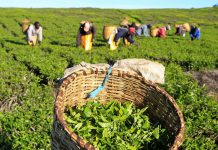Author: ALPHA NUHU
AfricaPress-Tanzania: TANZANIA Fertiliser Regulatory Authority (TFRA) has invited local and foreign investors to seize the existing investment opportunities in the fertiliser value chain and build more factories in the country.
“The government through the Tanzania Investment Centre (TIC) has opened windows for any investor in the fertiliser value chain. TFRA invites more investors in fertiliser manufacturing as there are huge local and foreign markets,” TFRA Executive Director, Dr Stephan Ngailo, told reporters in Dar es Salaam.
He said current investment opportunities existing in the fertiliser value chain included manufacturing and packaging, international trade, clearing and forwarding, domestic distribution, market linkages and storage. Other areas of investment are financing, quality assurance and publicity.
“Domestic manufacturing will reduce fertiliser prices, create employment for Tanzanians and contribute to the national economy at large,” Dr Ngailo told journalists at a press conference held to brief them on the commemoration of Global Fertiliser Day on October 13 in Morogoro Region.
Tanzania, a country well-known by international economists, boasts of an enabling business environment taking into account such factors as political will, ever-increasing population and assured fertiliser markets, the presence of raw materials such as natural gas and phosphates, huge local and foreign markets, favourable infrastructure, agro-processing industries and financial institutions.
According to Dr Ngailo, in the past five years fertiliser utilisation has increased by 48.6 per cent from 296,036 metric tonnes in 2015/16 to 440,000 metric tonnes in 2019/20.
Similarly, the availability of fertilisers such as Urea, DAP, NPK, CAN and SA has also jumped from 330,676 metric tonnes in the 2014/15 farming season to 582,357 metric in 2019/2020, Dr Ngailo said.
“The past five years have also seen an increase in the construction of fertiliser and fertiliser supplements factories. Before 2016, Tanzania had four fertiliser plants and there was no single factory for fertiliser supplements,” he said.
With the creation of an enabling environment, the TFRA boss said factories manufacturing fertilisers had increased to 11, while two factories manufacturing fertiliser supplements had also been built.
So far, TFRA has attained notable achievements in the fertiliser business through the introduction of a fertiliser bulk procurement system (BPS) which has made it possible for people with limited capital and experiences in international trade dynamics to participate in fertiliser import markets.
This system has increased market competitiveness that contributes to the lowering of fertiliser prices while increasing quality and utilisation, Dr Ngailo said.
Meanwhile, 400 participants – who include agricultural professionals from high-learning agricultural research institutes, 15 companies engaged in the manufacture, importation and distribution of fertilisers as well smallholder farmers will gather at Dakawa Village in Mvomero District to celebrate fertilisers and their essential role in sustaining the country’s growing population.
The occasion, to be graced by Minister for Agriculture Japhet Hasunga, will herald the commemoration of Global Fertiliser Day marked worldwide to remember the Haber-Bosch patent on the synthesis of ammonia from air in 1908, which sowed the seeds for the Green Revolution of the early 20th century.
Dr Ngailo said the event would be an opportunity for agricultural experts to educate the people on the benefits and uses of fertilisers and encourage them on the use of innovation in agriculture for a sustainable future.
Fertilisers have helped revolutionise the agricultural sector in Tanzania as a key economic driver.







